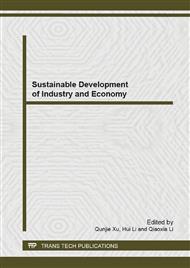p.967
p.971
p.976
p.980
p.986
p.991
p.997
p.1001
p.1005
Research on Decoupling Relationship between Shanghai Industrial Economic Growth and Carbon Emissions
Abstract:
With the highly speedy development of China's economy, carbon emissions simultaneously increasing rapidly. China has taken a series of energy saving measures and decomposes the control indicators and allots them to the different regions. As the fastest developing city in China, ShanghaiCO2 emissions has reached the level of developed countries. In this paper, the authors use the decoupling methods of OECD and Tapio to analysis the relationship between Shanghai industrial economic growth and carbon emissions. The results shows that exist the relative decoupling between the two indexes but the essence is limit of the CO2 emissions growth rate.
Info:
Periodical:
Pages:
986-990
Citation:
Online since:
December 2013
Authors:
Keywords:
Price:
Сopyright:
© 2014 Trans Tech Publications Ltd. All Rights Reserved
Share:
Citation:


